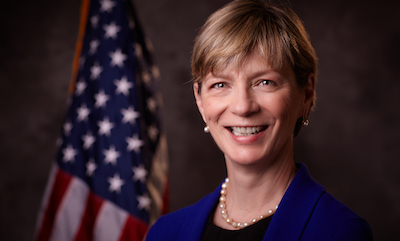Marylou Sudders: ‘Zip Code Should Not Predict Health Status’.

Professionally trained as a social worker, Marylou Sudders says public health and social work have a vital bond.
“Both professions understand the inextricable link between the person in the context of their environment and the impact on individual and community health,” says the secretary of the Executive Office of Health and Human Services (EOHHS) of Massachusetts, who will deliver the 2016 SPH Convocation address on May 14.
Appointed by Governor Charlie Baker in January 2015, Sudders leads the largest executive agency in state government—a $19.4 billion state budget with 22,000 dedicated public servants—and oversees critical services that touch one in four residents of the Commonwealth.
When Sudders was Massachusetts Commissioner of Mental Health from 1996 to 2003, she championed legislative reforms including insurance parity, fundamental patient rights, the hospital interpreter law, and the creation of the first children’s mental health commission.
“The historic segregation of behavioral health and physical health has not served the US well—either at the individual, community, or societal level,” she says.
As Massachusetts restructures its Medicaid program, Sudders says the Baker administration aims to provide stronger linkages between physical and behavioral health:
“Promotion of mental health, reduction of the burden of disease, and research into greater understanding of [mental] illness and effective treatments must be public health priorities.”
Sudders says two other public health issues loom large in her mind: health disparities and the opioid epidemic.
“We must eliminate health disparities,” she says. “Zip codes should not be a predictor of a person’s health status.” Although Massachusetts now boasts the highest rate of health insurance coverage in the country, Sudders says there are still significant populations without access to quality, affordable health care.
“The uninsured are disproportionately young adults, Hispanic, and low income,” she says. “We must address the social determinants of health in order to improve the health of populations.”
Regarding the opioid epidemic, Sudders says the governor’s administration is moving in the right direction, “committed to a public health approach, from prevention to recovery.” With four people in Massachusetts dying from opioid overdoses every day, she says, “we are committed to bending the trend.
“Addictions are a chronically relapsing medical condition, not a lack of willpower. Our efforts must open the doors to treatment, rather than incarceration.”
For almost 10 years, Sudders headed the Massachusetts Society for the Prevention of Cruelty to Children. Prior to her appointment as secretary, Sudders was an associate professor and chair of health and mental health at Boston College’s Graduate School of Social Work. Sudders has served on many charitable boards throughout her career, including the Pine Street Inn, Massachusetts Association for Mental Health, and the National Alliance on Mental Illness.
In 2012, Sudders was appointed as the behavioral health expert to the Commonwealth’s Health Policy Commission (HPC), and she remains on the commission in her capacity as secretary.
She has received an honorary doctorate from the Massachusetts School of Professional Psychology and was named Social Worker of the Year by the Massachusetts Chapter of the National Association of Social Workers. She was also nationally recognized with the Knee-Whitman Outstanding Achievement for Health & Mental Health Policy from the National Association of Social Workers Foundation.
Sudders says she is honored to give this year’s convocation address—and recommends public service to new SPH graduates. “Public service is a privilege and provides a great professional opportunity,” she says.
“Consider public service as part of your professional journey—either at the local, state, or national level.”
Follow the SPH Convocation on Twitter and Instagram at #BUSPH2016.